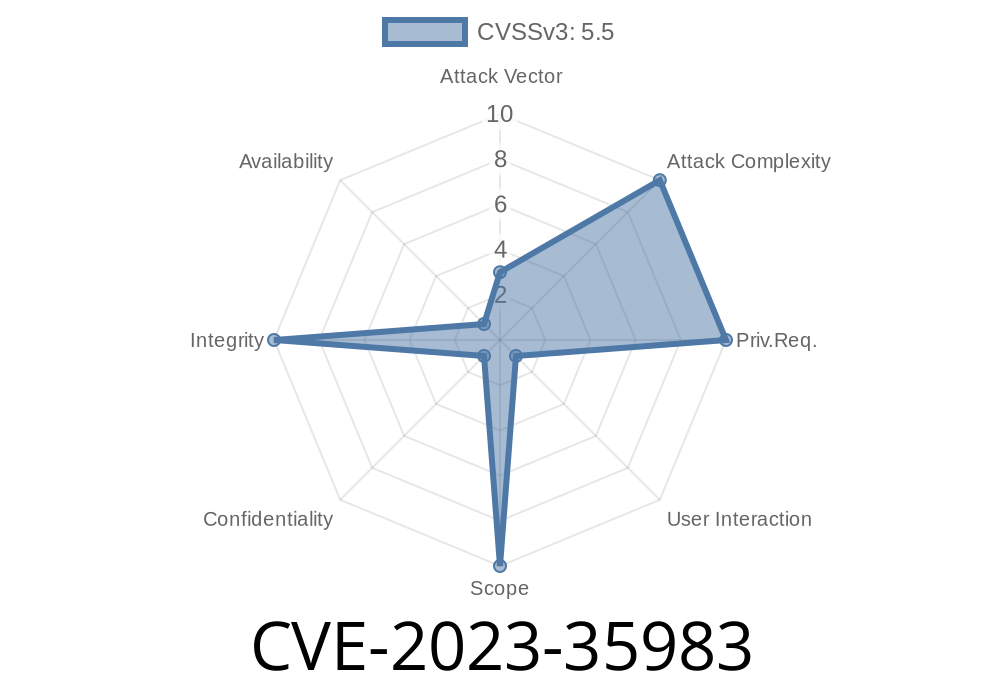In the world of Apple security, CVEs are like punctuations in a very long story. But sometimes, one pops up that really matters – like CVE-2023-35983, a vulnerability discovered in Apple’s macOS that could allow rogue apps to modify protected parts of your file system. Imagine an app changing core system files without your consent – the results could be bad for your privacy, security, and system stability.
In this exclusive post, we break down CVE-2023-35983 in simple American English. We'll look at what it does, how it could have been abused, how Apple fixed it, and even provide code snippets to show the vulnerability in action. Whether you're a developer, system admin, or just curious, this post is for you.
What is CVE-2023-35983?
CVE-2023-35983 is a security flaw found in macOS Monterey, Ventura, and Big Sur. The bug made it possible for an application, even if it was unprivileged, to change or tamper with files and folders that should have been protected by the operating system itself.
macOS Big Sur 11.7.9
If you’re not running at least these versions, you’re at risk!
Why Is This a Big Deal?
On macOS, the file system is supposed to be protected. System Integrity Protection (SIP) and other protections are in place so apps — especially those you don’t fully trust — cannot just change important parts of your system. If an untrusted app could write to protected directories, it could insert persistent malware, alter system behavior, or destroy data.
Technical Details: What Exactly Was the Problem?
The core issue was with improper data protection in certain file system operations. Some applications, under specific conditions and using clever tricks, could bypass file system protection and write to places like /System or /Library — areas normally locked down by SIP.
For example, macOS should prevent even root users (unless SIP is turned off) from altering certain files. This bug let an app bypass those safeguards.
Exploiting CVE-2023-35983: Demonstration
Note: This is a simplified demonstration, not a real exploit.
Let’s pretend the bug allowed us to write to /System/Library/MyProtectedFile. Under normal circumstances, this should never work.
Code Sample: Writing to a Protected Directory
import os
TARGET_FILE = "/System/Library/MyProtectedFile"
DATA = "Hello, I should not be able to write here!\n"
try:
with open(TARGET_FILE, "w") as f:
f.write(DATA)
print("SUCCESS: Managed to modify a protected file!")
except Exception as e:
print(f"FAILED: {e}")
Normally, running this would raise a permission error. With the bug, attackers could find ways around it. For the real exploit, attackers could use macOS system APIs in unexpected ways or exploit flaws in how permissions were checked.
Advanced Exploit Technique: File System Race Condition
One advanced way to take advantage of these bugs is a "race condition". Imagine a crafty app rapidly creating and deleting files where the operating system can get confused about what should and shouldn't be allowed.
Code Snippet: Simulating a Race Condition Exploit (Conceptual)
import threading
import os
import time
def create_symlink():
for _ in range(10000):
try:
os.symlink('/System/Library/MyProtectedFile', '/tmp/target')
except FileExistsError:
pass
finally:
try:
os.remove('/tmp/target')
except FileNotFoundError:
pass
def write_to_target():
for _ in range(10000):
try:
with open('/tmp/target', 'w') as f:
f.write('Exploit attempt!')
except Exception:
pass
t1 = threading.Thread(target=create_symlink)
t2 = threading.Thread(target=write_to_target)
t1.start()
t2.start()
t1.join()
t2.join()
Important: The above code would not work on patched systems or without the specific vulnerability, but this race approach is a common pattern for attacking file system protections.
How Did Apple Fix It?
Apple addressed CVE-2023-35983 by improving data protection. This likely means Apple made sure all "write" operations to protected directories double-check permissions and don’t trust app-level tricks.
In security-speak: Apple hardened checks and dropped privilege where needed so rogue apps could no longer gain write access via system bugs.
Never run apps from untrusted sources.
Many threats attempt to exploit vulnerabilities like this with pirated/cracked software and fake installers.
Review Permissions.
Use System Preferences > Security & Privacy > Privacy to limit which apps have access to files and folders.
References
- Apple Security Updates - July 2023
- Apple Release Notes: macOS Monterey 12.6.8
- CVE-2023-35983 on MITRE
Conclusion
CVE-2023-35983 was a serious vulnerability in macOS that could have let greedy or malicious apps break past the tough walls Apple built around your system. Updates are already out, so protect yourself by making sure your Mac is up to date. And remember: the more you know about these issues, the better you can keep your digital life safe.
Stay secure, update early, and don’t ever trust a random app with your core system!
Exclusive Summary:
This deep dive into CVE-2023-35983 gives you a clear look at a file system vulnerability, how attackers could exploit it, the quick fix from Apple, and concrete ways you can stay safe. If you found this guide useful, share it with your friends and help spread smart security practices for all Mac users!
Timeline
Published on: 07/27/2023 00:15:15 UTC
Last modified on: 08/02/2023 00:46:23 UTC
